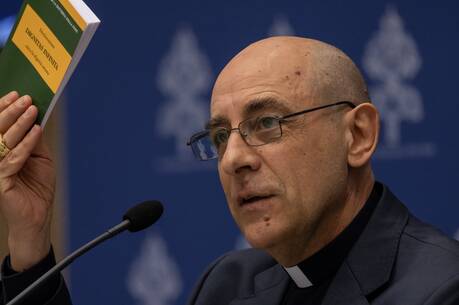These last seven days of Advent are a special time of the Church year, among my favorites on the liturgical calendar. Not only do the readings for the daily Masses just before Christmas include the beginnings of the Gospel infancy narratives (Matthew 1 on Dec. 17-18; Luke 1 on Dec. 19-24), but we again get to hear the traditional “O Antiphons,” both at Mass and at Evening Prayer.<?xml:namespace prefix = o ns = "urn:schemas-microsoft-com:office:office" />
Most familiar these days from the popular hymn, “O Come, O Come, Emmanuel,” the “O Antiphons” are more than a thousand years old (based on a 9th-century chant). They have long been used at the very end of the Advent Season as antiphons for the “Magnificat” sung or recited during the Evening Prayer of the Liturgy of the Hours. Since the Second Vatican Council, they have also been adapted (slightly reworded and rearranged) for the “Alleluia Verse” preceding the Gospel reading at the weekday Masses.
Curiously, the first verse of the familiar hymn is actually the last of the traditional “O Antiphons” (for Dec. 23), while the other verses of the hymn (in the order printed in most hymnals) correspond to the Antiphons for Dec. 17 to 22. Here is an overview of the seven antiphons, with the image used during Evening Prayer in the first line, and the second line showing the beginning of the corresponding verse of the hymn:
Dec. 17:O Sapientia / O Wisdom
Verse 2: O Come, Thou Wisdom, from on high
Dec. 18:O Adonai / O Sacred Lord of ancient <?xml:namespace prefix = st1 ns = "urn:schemas-microsoft-com:office:smarttags" />Israel
Verse 3: O Come, O Come, Thou Lord of might
Dec. 19:O Radix Jesse / O Flower of Jesse’s stem
Verse 4: O Come, Thou Rod of Jesse’s stem
Dec. 20:O Clavis David / O Key of David
Verse 5: O Come, Thou Key of David, come
Dec. 21:O Oriens / O Radiant Dawn
Verse 6: O Come, Thou Dayspring from on high
Dec. 22:O Rex Gentium / O King of all the nations
Verse 7: O Come, Desire of nations…
Dec. 23:O Emmanuel / O Emmanuel
Verse 1: O Come, O Come, Emmanuel
The Alleluia verses for the weekday Masses use the same images in the same order for Dec. 17-20, but in a slightly different order the rest of the week: “O Emmanuel…” is used on Dec. 21; “O King of all nations…” on both Dec. 22 and Dec. 23; “O Radiant Dawn” at morning Masses on Dec. 24. [See my webpage on the “O Antiphons” for an overview of the Latin and English versions of the texts used during Evening Prayer and at Mass, the lyrics from the Advent hymn, and references to some scriptural passages upon which these texts are based.]
Unfortunately, some congregations sing the first verse of the hymn over and over again during the Advent season, starting already on the First Sunday. Although many might also sing the second and third verses, few get around to singing all the verses with their scripturally poetic images. Ideally, the hymn “O Come, O Come, Emmanuel” would be sung only during this lastweek of Advent (one verse each day?). But since the hymn is so popular (some people might not feel like it was Advent unless they heard this hymn!), it is understandable that many parishes sing it earlier, or even every Sunday, as a way of unifying the whole season. I only wish that they sang all the other verses at some time, and tried to reserve the “Emmanuel” verse until the last week, as we draw closer to celebrating the birth of “God with us.”
A related problem arises when people hear the Gospel reading for the Fourth Sunday of Advent, in Year A (Matthew 1:18-24). On the one hand, the angel tells Joseph in a dream, “you are to name him Jesus, because he will save his people from their sins” (1:21). On the other hand, Matthew claims that this fulfills the words of the prophet Isaiah, “they shall name him Emmanuel” (Matt 1:23, citing Isa 7:14, part of this Sunday’s First Reading). But how is naming the child “Jesus” a fulfillment of Isaiah’s prophecy? Why wasn’t the baby explicitly named “Emmanuel” instead?
This question actually came up several times at various Advent retreats and workshops I gave this month. In response, I reminded the people that the name “Jesus” means “God saves us,” and then asked them to reflect on this question: In Christian understanding, HOW does God save us? Isn’t it precisely THROUGH the birth (and subsequent life, death, and resurrection) of Jesus? God could have chosen to save all humanity in some other way, intervening directly in human affairs, bringing about the long-awaited messianic age with a snap of the divine fingers, so to speak. But that’s not what God chose to do; rather, God decided to save us in and through Jesus, whose incarnation bridged the divine-human gap, making God more visible, understandable, and accessible for us.
So, what is the meaning of “Emmanuel” in our own age, when people so often feel alienated, alone, and abandoned, as if God is not with us? And from what do we need to be saved, as we prepare to celebrate the birth of Jesus, the Savior? What do the profound images of the other “O Antiphons” (Key of David, Radiant Dawn, Wisdom from on High…) evoke within us? Each of these symbols could provide wonderful material for meditation, even if only for short moments during this hectic week just before Christmas.
Felix Just, S.J.







